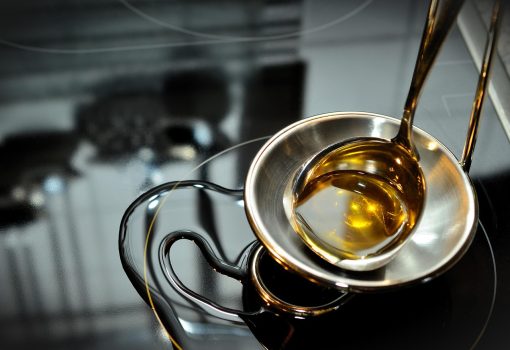 Pin
Pin Image by congerdesign from Pixabay
Choosing the right oil affects more than just taste—your heart, brain, and even your metabolism respond to it every single day. Most people grab whatever’s cheap or familiar, like sunflower or mustard oil, without thinking about long-term effects. But the truth is, the oil you use can either support your health or slowly work against it. That’s why knowing which oil is best for health is important if you care about what you put in your body.
You’ve probably heard terms like “refined,” “cold-pressed,” or “PUFAs” and ignored them. But those labels matter. Refined oils often lose nutrients due to high heat and chemicals. On the other hand, cold-pressed oils retain natural antioxidants. If you’re cooking at high temperatures, smoke point becomes a huge deal too. Low smoke point oils can produce harmful compounds that hurt your health.
In short, oil isn’t just a cooking medium—it’s part of your diet. And it’s worth digging into what’s safe and what isn’t.
Table of Contents
Understanding the Basics: Saturated vs Unsaturated Oils
When trying to decide which oil is best for health, it’s crucial to understand the two main types of fats in oils—saturated and unsaturated. Saturated fats are more stable and less likely to oxidize, but too much of them can raise LDL cholesterol. These are usually found in coconut oil, palm oil, and ghee. Unsaturated fats, which include monounsaturated and polyunsaturated fats, are generally considered better for heart health and are found in oils like olive, mustard, and sunflower.
Now, here’s where it gets tricky. Not all saturated fats are evil, and not all unsaturated oils are good in every form. The processing method matters a lot. For example, cold-pressed oils retain natural vitamins, while heavily refined oils often lose them. Some polyunsaturated oils, like soybean or corn oil, may contain too much omega-6, which causes inflammation if not balanced with omega-3.
So instead of obsessing over labels, think about balance and preparation methods. You don’t need to cut any oil completely—but you do need to know what’s going into your meals.
Olive Oil: The Golden Standard or Just Hype?
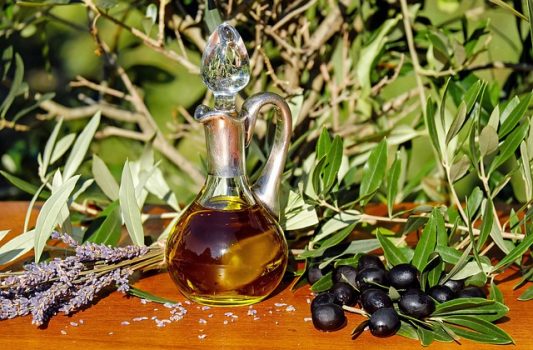 Pin
Pin Image by Couleur from Pixabay
Olive oil is often praised like a superfood, but is it really the best choice for Indian kitchens or just a Western marketing win? First, let’s talk health. Extra virgin olive oil is rich in monounsaturated fats and antioxidants like polyphenols, which are great for heart and brain health. That makes it a strong contender when asking which oil is best for health.
But it’s not a one-size-fits-all situation. Olive oil has a lower smoke point compared to others like rice bran or groundnut oil. That means it’s not ideal for deep frying or long-time cooking at high temperatures. So, if you’re using it to sauté veggies or drizzle over a salad, go ahead. Just don’t use it to make your samosas or pakoras.
Also, many so-called “extra virgin” olive oils in the market are blended or fake. Always check for certifications like COOC or PDO to ensure purity. Olive oil is excellent—but only if used right and bought from trusted sources.
Mustard Oil: Traditional, Flavorful, and Surprisingly Healthy
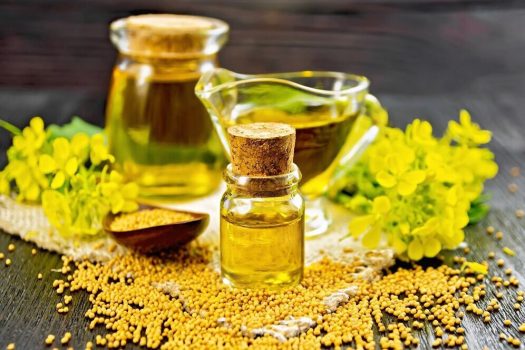 Pin
Pin Image from Freepik
Mustard oil has been a staple in Indian kitchens for generations, and for good reason. It has a strong, pungent flavor that gives food a distinct edge, especially in eastern and northern parts of India. But aside from the taste, mustard oil packs a serious health punch. Rich in monounsaturated fats and omega-3 fatty acids, it helps in reducing inflammation and improving heart function. It’s no wonder many nutritionists are revisiting this traditional oil while debating which oil is best for health.
Another underrated benefit is its high smoke point. That makes mustard oil great for Indian-style cooking—frying, roasting, and sautéing. Plus, its natural antibacterial and antifungal properties make it more than just cooking fat. Some even use it for massages or in skincare.
However, there’s one catch. Raw mustard oil contains erucic acid, which some studies link to heart problems. The solution? Always use “kachi ghani” or cold-pressed and ensure it’s labeled as “edible.” It’s safe when used correctly and packs both taste and health.
Coconut Oil: Villain or Secret Health Weapon?
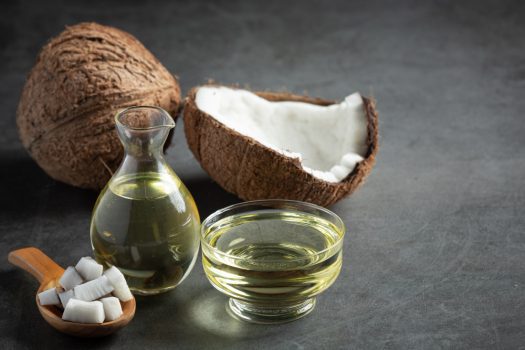 Pin
Pin Image from Freepik by jcomp
Coconut oil is one of the most debated oils when it comes to health. Some swear by it, calling it a miracle for digestion, weight loss, and even mental clarity. Others warn against its high saturated fat content, claiming it can raise cholesterol. So, which side is right? And when asking which oil is best for health, does coconut oil even make the cut?
Here’s the truth: coconut oil is high in saturated fat, but it’s mostly medium-chain triglycerides (MCTs). These are processed differently by the body and can be quickly used as energy. Some studies also show it raises HDL (good) cholesterol along with LDL. It’s also antimicrobial and stable at high temperatures, making it good for frying.
But moderation is key. If your diet already includes other sources of saturated fat, loading up on coconut oil might tip the balance. Use virgin coconut oil for maximum health benefits and avoid the refined ones. It’s great when used wisely, not excessively.
Sunflower Oil: Popular but Not Always the Healthiest
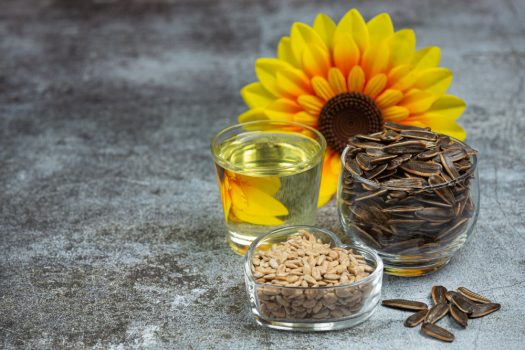 Pin
Pin Image from Freepik by jcomp
Sunflower oil is in almost every Indian household—it’s affordable, light in taste, and works well for frying. But popularity doesn’t always equal health. This oil is high in omega-6 fatty acids, which your body does need, but only in the right proportion. When you consume too much omega-6 without balancing it with omega-3, it can lead to chronic inflammation. That’s a major red flag when thinking about which oil is best for health.
Most refined sunflower oils on the market go through heavy processing, which removes natural nutrients and often adds chemicals. Plus, when heated to high temperatures repeatedly, it can release harmful compounds that are tough on your heart and liver.
If you want to use sunflower oil, look for cold-pressed or minimally processed versions. Also, balance it with omega-3-rich foods like flaxseeds, walnuts, or fatty fish. Sunflower oil isn’t all bad—but it’s far from being the safest option if you don’t pair it with better food choices and healthier cooking habits.
Groundnut Oil: A Balanced, Nutty Option for Everyday Use
 Pin
Pin Image from Freepik
Groundnut oil, also called peanut oil, often flies under the radar—but it’s a solid choice for daily cooking. It has a nice nutty flavor that enhances dishes without overpowering them, and more importantly, it has a good mix of monounsaturated and polyunsaturated fats. That’s a big win if you’re trying to decide which oil is best for health.
Its high smoke point makes it safe for deep frying and other high-heat cooking. That means fewer harmful compounds are produced during the cooking process. It’s also naturally rich in vitamin E, which acts as an antioxidant and supports skin and immune health. Plus, cold-pressed groundnut oil doesn’t go through harsh refining, so you keep more of those nutrients intact.
The only caution? If someone has a peanut allergy, this oil is obviously off-limits. Also, like all oils, don’t overdo it. Even healthy oils can become a problem when used in excess. But overall, groundnut oil is versatile, safe, and pretty underrated in the health game.
Rice Bran Oil: The Quiet Performer with Heart-Friendly Perks
 Pin
Pin Image from Freepik
Rice bran oil isn’t as famous as olive or mustard oil, but it deserves more attention. Extracted from the outer layer of rice, it contains a unique antioxidant called oryzanol, which has been shown to help reduce cholesterol levels. If you’re asking which oil is best for health and want something that fits modern cooking styles, rice bran oil should be on your radar.
It has a high smoke point and a neutral taste, which makes it ideal for deep frying and stir-frying without altering the flavor of your food. It’s also packed with vitamin E and plant sterols, which add to its heart-friendly profile. Unlike some refined oils, good-quality rice bran oil doesn’t leave a heavy, greasy feel.
Still, go for brands that use minimal processing or label the oil as physically refined. Avoid blended versions unless you know what’s mixed in. Rice bran oil isn’t flashy or trendy, but it brings a strong balance of nutrition and cooking practicality to the table.
Blended Oils: Smart Mix or Just a Marketing Trick?
Blended oils are everywhere now—labels proudly say “heart-healthy blend of rice bran and soybean” or “olive and sunflower mix.” The idea is to combine the benefits of different oils into one product. It sounds smart, but it also raises questions. Can a mix really offer the best of both worlds? And does it count when we ask which oil is best for health?
Some blends genuinely help balance fatty acid profiles—like mixing high omega-6 oils with omega-3-rich ones. That can reduce the risk of inflammation and support heart health. Blends also often have higher smoke points, making them suitable for Indian cooking. But not all are created equal.
Many commercial blended oils are ultra-refined and processed with chemicals. Labels can be misleading, with only a tiny percentage of the “premium” oil actually included. Always read the ingredients list and make sure you’re not just paying for a name. Blends can work—but only when they’re transparent, well-formulated, and not just a marketing gimmick.
How to Choose the Safest Oil for Your Needs
So, which oil is best for health? The answer isn’t one single winner—it’s about the right oil for the right purpose and balance in your overall diet. If you’re deep frying, go for high smoke point oils like groundnut, rice bran, or mustard oil. For salads or low-heat cooking, extra virgin olive oil adds antioxidants and healthy fats. Coconut oil works well in moderation for specific uses, and traditional oils like mustard or ghee can be part of a healthy routine when used thoughtfully.
Instead of sticking to just one oil, rotate between a few good ones. That way, you avoid overloading on any one type of fat or missing out on key nutrients. Always go for cold-pressed or minimally processed oils. And steer clear of overly refined, cheap options—they may save money now but cost you later in health.
Your choice of oil isn’t a small detail—it’s something you use daily. Choosing the safest, most health-supportive oil is one of the easiest ways to protect your long-term well-being.
FAQs
Cold-pressed mustard oil and groundnut oil are among the best choices for Indian cooking. They have high smoke points and contain heart-friendly fats, making them suitable for frying and sautéing.
Extra virgin olive oil is great for low-heat cooking and salads but not ideal for deep frying. For Indian dishes that require high heat, use refined olive oil or switch to oils like rice bran or groundnut.
Refined oils go through chemical processing that can strip away nutrients. While they may look clear and clean, they often lack antioxidants and may contain harmful residues. Cold-pressed oils are a healthier option.
Yes, rotating between oils like mustard, olive, coconut, and rice bran gives your body a mix of healthy fats and nutrients. It helps avoid overconsumption of any one type of fat.
Always check for “cold-pressed” or “wood-pressed” labels, avoid hydrogenated or overly refined oils, and read ingredient lists for hidden blends or additives. Opt for oils with minimal processing and natural nutrients.





























